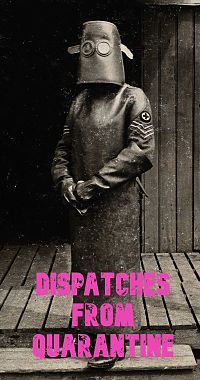 Across the nation theatres are dark, and set to remain so for who knows how long. The Guthrie may be leading the way, staying closed until next spring.
Across the nation theatres are dark, and set to remain so for who knows how long. The Guthrie may be leading the way, staying closed until next spring.
A murkier question: What shows will theatres program when they do reopen? Will there be a glut of budget-friendly one-person shows? Will the seasons be more diverse? Will there be more commercial work and revivals to swell box office?
One thing is clear: People aren’t exactly clamoring to see plays about the current nightmare. In the early weeks of the crisis on social media, it was not uncommon to see sneering advance rejection of quarantine plays. Folks who are busy hating their socially distanced present seem to feel double disgust at the prospect of reliving it onstage. And how could a play or musical or monologue possibly capture the absurd mix of Zoom-mediated boredom and epidemiological horror we’re experiencing now?
It can’t, a drive-by commentator will assert. Except for face-mask memes, quarantined family music videos or Milo Manara, we don’t want your coronavirus art. The pseudonymous Nicholas Berger (no one knows who they really are) published a long-winded, alarmist essay on Medium basically framing Instagram Live monologues as the digital demolition of 2,500-year-old theatrical tradition. It’s the rise of the machines, Berger lamented, and Thespis weeps.
In a less Cassandra-ish vein, Mark Harris, a film writer (and Tony Kushner’s partner) tweeted sardonically on April 6, 2020: “I’m sorry to share more bad news, but 13 out of the 16 dramatic competition movies at Sundance 2022 are going to be about couples or families or a mother and daughter or two strangers working out their issues during quarantine.”
Cute—but the joke raises a perennial question: Isn’t the role of art, especially mimetic arts such as theatre, to process and stage reality, particularly complex, traumatic reality? Current events have been theatrical grist from The Trojan Women to Sweat, and to discourage artists from dramatizing headlines smacks of cultural policing and insults the moral authority of the form.
All the same, who doesn’t shudder at a tidal wave of COVID-19-inspired work in a year or two that falls short of the mark? The odds of tackiness are so high. And yet we need a great drama that analyzes what went wrong with the system, and how our national character is tied up with the crisis. I can see both sides.

In 1933, George Jean Nathan, dean of American theatre critics, published Since Ibsen, a Statistical Historical Outline of the Popular Theatre Since 1900, a soberly titled but cheeky volume comprising pithy sentences and paragraphs, by which Nathan catalogued thousands of plots, speeches, stage gestures, trends, and tropes—all invented to mock current theatrical fashions. “[It] is probable that certain casual readers will dismiss this as a lightly humorous book,” wrote Nathan in his foreword. “This will grieve the author.”
With Since Ibsen as my model, I peer into the future to divine what’s coming down the pike. Some of it may sound grotesque or impossible, some frighteningly plausible, but all of it was submitted in good faith by the fictitious authors of my idle imagination. Oh, also: Each abominable pitch is ©2020 me. A writer has to make a living.
The Naturalistic Family Drama
- An examination of two brothers—one who stayed in his Queens studio during the quarantine, the other who decamped to their wealthy family’s summer home in Sands Point—and the resentment between them as it reaches a boiling point.
- Josie Kellner, staunch matriarch and manufacturer of personal protective equipment, sent product to market knowing it was defective, and now has blood on her hands—and copyright infringement from the Miller estate.
- At a Thanksgiving dinner, Mother explodes, bitterly accusing her college-age daughter of murdering her father by bringing the virus home after her “slutty” spring break. Juicy family secrets emerge.
Love-It-Or-Hate-It Eurochic Revival
- A diverse, modern-dress, multimedia The Music Man in which Professor Harold Hill brings hope to River City, as well as respiratory illness and death.
Movement Theatre
- Indeterminate tribes dance-battle over individual freedom versus collective action in color-coordinated leotards spouting blank verse.
Hard-Hitting Issue Drama
- A comically bigoted uncle in a red state believes the pandemic is all a hoax, protests the quarantine, sickens, and dies—but not before tearfully apologizing to his gay, liberal nephew.
- A wealthy family realizes everyone they employed as servants, drivers, cleaners, and tutors has died from the virus. They resolve to do better.
- Direct from London, a play about tourists holed up in a seaside hotel to debate world events, get drunk, and eventually turn on a racist American.
Sexy Psychodrama
- Kinky quarantined couple explores erotic limits while shut in. After intense roleplay, BDSM, and soul-baring, they are revealed to be nurse and patient in a folie à deux.
Multimedia Experiment
- The Zoom Project, in which set, sound, and video designers meticulously recreate jumbo-sized Zoom windows onstage, with actors performing from home for reduced scale.
Taboo-Busting Comedy
- Hapless children’s puppet troupe tries to explain the crisis to fourth-graders in assembly—but due to love affairs and bad research, it all goes wrong!
New Broadway Musicals of 2022
- Dystopian fantasy in which zootic viruses leave survivors with animal features: rooster head, lizard legs, etc. Audiences exit humming the 11th-hour power ballad “Unnatural Selection.”
- Jaunty musical comedy in which a small-town microbiologist moves to the big city, falls in love with the brassy epidemiologist down the hall, and literally stumbles into discovering the vaccine.
- Hip-hop Decameron.
Confessional Show
- Painfully honest monologue by quarantined author that ends with them embracing everyone in the audience, which takes at least 20 minutes of time you could be at the bar.
But That’s Not Funny
- Found-text docudrama that juxtaposes topical humor pieces with accounts of mass death and lethal government incompetence.
David Cote is a theatre critic, playwright, and librettist. His most recent opera, Blind Injustice, premiered last July at Cincinnati Opera.

